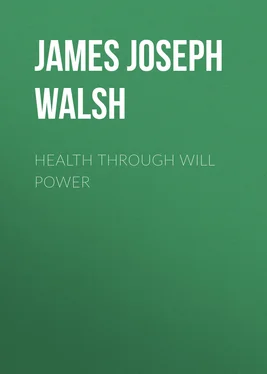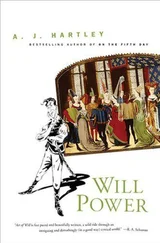James Walsh - Health Through Will Power
Здесь есть возможность читать онлайн «James Walsh - Health Through Will Power» — ознакомительный отрывок электронной книги совершенно бесплатно, а после прочтения отрывка купить полную версию. В некоторых случаях можно слушать аудио, скачать через торрент в формате fb2 и присутствует краткое содержание. Жанр: foreign_prose, psy_theraphy, foreign_edu, foreign_antique, на английском языке. Описание произведения, (предисловие) а так же отзывы посетителей доступны на портале библиотеки ЛибКат.
- Название:Health Through Will Power
- Автор:
- Жанр:
- Год:неизвестен
- ISBN:нет данных
- Рейтинг книги:5 / 5. Голосов: 1
-
Избранное:Добавить в избранное
- Отзывы:
-
Ваша оценка:
- 100
- 1
- 2
- 3
- 4
- 5
Health Through Will Power: краткое содержание, описание и аннотация
Предлагаем к чтению аннотацию, описание, краткое содержание или предисловие (зависит от того, что написал сам автор книги «Health Through Will Power»). Если вы не нашли необходимую информацию о книге — напишите в комментариях, мы постараемся отыскать её.
Health Through Will Power — читать онлайн ознакомительный отрывок
Ниже представлен текст книги, разбитый по страницам. Система сохранения места последней прочитанной страницы, позволяет с удобством читать онлайн бесплатно книгу «Health Through Will Power», без необходимости каждый раз заново искать на чём Вы остановились. Поставьте закладку, и сможете в любой момент перейти на страницу, на которой закончили чтение.
Интервал:
Закладка:
James J. Walsh
Health Through Will Power
PREFACE
A French surgeon to whom the remark was made in the third year of the War that France was losing an immense number of men replied: "Yes, we are losing enormously, but for every man that we lose we are making two men." What he meant, of course, was that the War was bringing out the latent powers of men to such an extent that every one of those who were left now counted for two. The expression is much more than a mere figure of speech. It is quite literally true that a man who has had the profound experience of a war like this becomes capable of doing ever so much more than he could before. He has discovered his own power. He has tapped layers of energy that he did not know he possessed. Above all, he has learned that his will is capable of enabling him to do things that he would have hesitated about and probably thought quite impossible before this revelation of himself to himself had been made.
In a word, the War has proved a revival of appreciation of the place of the human will in life. Marshal Foch, the greatest character of the War, did not hesitate even to declare that "A battle is the struggle of two wills. It is never lost until defeat is accepted. They only are vanquished who confess themselves to be."
Our generation has been intent on the development of the intellect. We have been neglecting the will. "Shell shock" experiences have shown us that the intellect is largely the source of unfavorable suggestion. The will is the controlling factor in the disease. Many another demonstration of the power of will has been furnished by the War. This volume is meant to help in the restoration of the will to its place as the supreme faculty in life, above all the one on whose exercise, more than any other single factor, depends health and recovery from disease. The time seems opportune for its appearance and it is commended to the attention of those who have recognized how much the modern cult of intellect left man unprepared for the ruder trails of life yet could not see clearly what the remedy might be.
CHAPTER I
THE WILL IN LIFE
"What he will he does and does so much
That proof is called impossibility."
The place of the will in its influence upon health and vitality has long been recognized, not only by psychologists and those who pay special attention to problems of mental healing, but also, as a rule, by physicians and even by the general public. It is, for instance, a well-established practice, when two older folk, near relatives, are ill at the same time, or even when two younger persons are injured together and one of them dies, or perhaps has a serious turn for the worse, carefully to keep all knowledge of it from the other one. The reason is a very definite conviction that in the revulsion of feeling caused by learning of the fatality, or as a result of the solicitude consequent upon hearing that there has been a turn for the worse, the other patient's chances for recovery would probably be seriously impaired. The will to get better, even to live on, is weakened, with grave consequences. This is no mere popular impression due to an exaggeration of sympathetic feeling for the patient. It has been noted over and over again, so often that it evidently represents some rule of life, that whenever by inadvertence the serious condition or death of the other was made known, there was an immediate unfavorable development in the case which sometimes ended fatally, though all had been going well up to that time. This was due not merely to the shock, but largely to the "giving up", as it is called, which left the surviving patient without that stimulus from the will to get well which means so much.
It is surprising to what an extent the will may affect the body, even under circumstances where it would seem impossible that physical factors could any longer have any serious influence. We often hear it said that certain people are "living on their wills", and when they are of the kind who take comparatively little food and yet succeed in accomplishing a great deal of work, the truth of the expression comes home to us rather strikingly. The expression is usually considered, however, to be scarcely more than a formula of words elaborated in order to explain certain of these exceptional cases that seem to need some special explanation. The possibility of the human will of itself actually prolonging existence beyond the time when, according to all reason founded on physical grounds, life should end, would seem to most people to be quite out of the question. And yet there are a number of striking cases on record in which the only explanation of the continuance of life would seem to be that the will to live has been so strongly aroused that life was prolonged beyond even expert expectation. That the will was the survival factor in the case is clear from the fact that as soon as this active willing process ceased, because the reason that had aroused it no longer existed, the individuals in question proceeded to reach the end of life rapidly from the physical factors already at work and which seemed to portend inevitably an earlier dissolution than that which happened. Probably a great many physicians know of striking examples of patients who have lived beyond the time when ordinarily death would be expected, because they were awaiting the arrival of a friend from a distance who was known to be coming and whom the patient wanted very much to see. Dying mothers have lived on to get a last embrace of a son or daughter, and wives have survived to see their husbands for a last parting—though it seemed impossible that they should do so, so far as their physical condition was concerned—and then expired within a short time. Of course there are any number of examples in which this has not been true, but then that is only a proof of the fact that the great majority of mankind do not use their wills, or perhaps, having appealed to them for help during life never or but slightly, are not prepared to make a definite serious call on them toward the end. I am quite sure, however, that a great many country physicians particularly can tell stories of incidents that to them were proofs that the will can resist even the approach of death for some time, though just as soon as the patients give up, death comes to them.
Professor Stokes, the great Irish clinician of the nineteenth century, to whom we owe so much of our knowledge of the diseases of the heart and lungs, and whose name is enshrined in terms commonly used in medicine in connection with these diseases, has told a striking story of his experiences in a Dublin hospital that illustrates this very well. An old Irishman, who had been a soldier in his younger years and had been wounded many times, was in the hospital ill and manifestly dying. Professor Stokes, after a careful investigation of his condition, declared that he could not live a week, though at the end of that time the old soldier was still hanging on to life, ever visibly sinking. Stokes assured the students who were making the rounds of his wards with him that the old man had at most a day or two more to live, and yet at the end of some days he was still there to greet them on their morning visits. After the way of medical students the world over, though without any of that hard-heartedness that would be supposed ordinarily to go with such a procedure, for they were interested in the case as a medical problem, the students began to bet how long the old man would live.
Finally, one day the old man said to Stokes in his broadest brogue: "Docther, you must keep me alive until the first of the month, because me pension for the quarther is then due, and unless the folks have it, shure they won't have anything to bury me with."
Читать дальшеИнтервал:
Закладка:
Похожие книги на «Health Through Will Power»
Представляем Вашему вниманию похожие книги на «Health Through Will Power» списком для выбора. Мы отобрали схожую по названию и смыслу литературу в надежде предоставить читателям больше вариантов отыскать новые, интересные, ещё непрочитанные произведения.
Обсуждение, отзывы о книге «Health Through Will Power» и просто собственные мнения читателей. Оставьте ваши комментарии, напишите, что Вы думаете о произведении, его смысле или главных героях. Укажите что конкретно понравилось, а что нет, и почему Вы так считаете.












